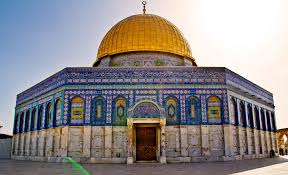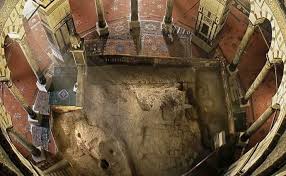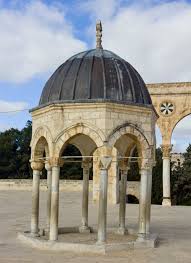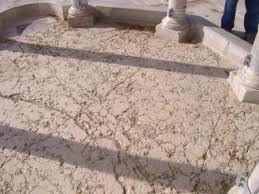Calvary Chapel – Leesville, SC Wednesday Evening Service August 19th, 2020
Review
In Genesis 21, we read about the birth of Isaac – the promised heir whom Abraham’s wife Sarah bore to him in her old age when she was 99 and Abraham was 100. God had first promised the coming of Isaac to Abraham at least 14 years before (Genesis 15:4). After the birth of Isaac, Sarah urged Abraham to cast out Isaac’s half-brother Ishmael who had been born to Abraham fourteen years earlier and his mother – Sarai’s Egyptian maid servant, Hagar. With God’s concurrence, Abraham sent Ishmael and Hagar out into the Negev desert where they would have died of thirst until God miraculously intervened by providing them a well of water. Finally, in Genesis 21, we saw that Abraham made a covenant with the Philistine ruler Abimelech regarding a well which Abraham had dug. The covenant was sealed with seven ewe lambs. Hence the well was named בְּאֵר שֶׁבַע Be’er Sheba` – well of the seven-fold oath.
A Test of Faith?
Now here in Genesis 22, we come to one of the most well-known and controversial stories in the entire Word of God – God’s call upon Abraham to sacrifice Isaac his promised heir as a burnt offering to the LORD. We are all naturally repulsed by the idea of a child sacrifice, especially in the light of God’s promises to Abraham regarding Isaac. In order to better understand the meaning of this story, let’s look at in terms of the lessons it has to teach the interested parties – Abraham, Isaac, present-day people, and Almighty God Himself.
1Now it came to pass after these things that God tested Abraham, and said to him, “Abraham!” And he said, “Here I am.” 2Then He said, “Take now your son, your only son Isaac, whom you love, and go to the land of Moriah, and offer him there as a burnt offering on one of the mountains of which I shall tell you.”
Genesis 22:1-2 – NKJV
The first thing that springs to mind as we read this story is the fact that Isaac was definitely not Abraham’s only son. There is no Biblical record of how long it had been since Abraham cast out Ishmael and Hagar into the desert. But certainly Abraham couldn’t have believed that Ishamael had perished in the desert, because we know from Genesis 17:20 that God had promised that Ishmael would beget twelve princes and that God would make Ishmael’s descendants a great nation. What God is saying to Abraham here in Genesis 21:2 is that Isaac was the only one of Abraham’s sons who factored into God’s plan of salvation. Recall that the purpose of God’s Word is to reveal and clarify His plan of salvation through the birth in the flesh, perfectly sinless life, sacrificial death on the cross for the remission of sin, and resurrection to life on the third day of the Messiah Jesus – Savior of Israel and of all mankind. Furthermore, we know that Genesis gives us the hereditary line of Jesus starting with the first promise of the coming Messiah given to Eve in the Garden of Eden, through Noah to his son Shem, then through Abraham, and now to Abraham’s promised son – Isaac.
Why then would God call upon Abraham to sacrifice Isaac – the promised heir for Abraham, and forefather of Jesus the Messiah? First of all, many of the aspects of the sacrifice of Isaac are symbolic and prophetic as we shall see – beginning with the place where the sacrifice was to be carried out. The land of Moriah referred to here in Genesis 21:2 later became the site of the city of Jerusalem upon which God would place His Name as His dwelling place on the Earth. The mountain God showed to Abraham was most likely Mt. Moriah (מוֹרִיָּה Mowriyah – chosen by Jehovah) – the mountain in the midst of the city now known as the Temple Mount. In Abraham’s time, the mountain consisted of two separate peaks – Mt. Moriah and Mt. Zion. Later, King Solomon filled in the area between the two peaks with a great earthwork called the Millo (מִלּוֹא millow’) (1 Kings 9:24). Upon the highest of these mountains – Mt. Moriah, Solomon built a vast platform supported by stone vaults. King Herod the Great later greatly expanded this platform. It remains today the largest man-made platform in the world. Upon the level top of the Temple Mount, Solomon built the first Jewish temple. That temple was later destroyed by the Babylonian army of Nebuchadnezzar. The second temple built after the Jews returned from the Babylonian captivity was replaced by the magnificent temple built by King Herod the Great which was standing on the Temple Mount during the time of Jesus. That temple was destroyed by the Romans in 70 AD just as Jesus had foretold to His disciples in Matthew 24:2.


Although the temple itself has been destroyed, the great platform – The Temple Mount – upon which it was built remains in Jerusalem today. Upon the temple mount, there are two locations where the bedrock of the mountain protrudes through the man-made platform. One of these lies inside the Dome of the Rock. This building which is a Muslim shrine today was constructed by the Crusaders as a Christian Church. Most Jewish authorities today believe that the so-called “Foundation Stone” within the Dome of the Rock was the base for the Most Holy Place in the Jewish temple where the Ark of the Covenant was placed.



The other flat protrusion of bedrock on the Temple Mount is underneath the Dome of the Spirits – a much smaller shrine about 100 meters northwest of the Dome of the Rock. Very likely, one of these two flat protrusions of bedrock on Mt. Moriah was also the location of the threshing floor which King David purchased from Araunah the Jebusite for the construction of an altar of burnt sacrifice before Solomon’s temple was built (2 Samuel 24). The winnowing of grain in the ancient world was done by pouring out the grain onto flat rocks and beating it with winnowing fans. The grain was then gathered into baskets and thrown up into the air so that the wind could blow away the chaff, and the winnowed grain would then fall back onto the rock to be gathered up and stored.
One of the two flat spots at the top of Mount Moriah was very likely the place God showed to Abraham here in Genesis 22 upon which Isaac was to be sacrificed, and which later became the location of the Most Holy Place where the Ark of the Covenant was placed. The glory of the living God descended upon the Mercy Seat of the Ark when Solomon dedicated the first temple (2 Chronicles 7).

3So Abraham rose early in the morning and saddled his donkey, and took two of his young men with him, and Isaac his son; and he split the wood for the burnt offering, and arose and went to the place of which God had told him.
Genesis 22:3 – NKJV
Abraham’s response to God’s call for the sacrifice of Isaac is noteworthy. Notice that he didn’t object or even question God’s command. He simply obeyed. Recall from Genesis 15:6 that Abraham’s faith in the LORD was credited to him for righteousness. But faith isn’t just a passive emotion. Faith in God is demonstrated by obedience to His calling and commands just as Abraham did unquestioningly here in this story.
18But someone will say, “You have faith, and I have works.” Show me your faith without your works, and I will show you my faith by my works. 19You believe that there is one God. You do well. Even the demons believe—and tremble! 20But do you want to know, O foolish man, that faith without works is dead? 21Was not Abraham our father justified by works when he offered Isaac his son on the altar? 22Do you see that faith was working together with his works, and by works faith was made perfect? 23And the Scripture was fulfilled which says, “Abraham believed God, and it was accounted to him for righteousness.” And he was called the friend of God. 24You see then that a man is justified by works, and not by faith only.
James 2:18-24 – NKJV
17By faith Abraham, when he was tested, offered up Isaac, and he who had received the promises offered up his only begotten son, 18of whom it was said, “In Isaac your seed shall be called,” 19concluding that God was able to raise him up, even from the dead, from which he also received him in a figurative sense.
Hebrews 11:17-19 – NKJV
Notice also that God didn’t need to give Abraham detailed instructions for the preparation of the burnt offering. Although the Law concerning offerings to God was not be given to Moses until many hundreds of years later, Abraham needed no directions. Apparently, there was already a tradition of burnt offerings among the Hebrew people during the time of Abraham which would later be formalized in the written Law given by God to Moses.
4Then on the third day Abraham lifted his eyes and saw the place afar off.
Genesis 22:4 – NKJV
Much has been written and preached about the significance and symbolism of the fact that Abraham first sighted Mt. Moriah on the third day after setting out from Beersheba. We won’t add to that speculation here except to say that the journey by donkey through the mountains of Judea is a little over 50 miles, and would take about 20 hours in that rugged terrain. Thus the journey would have taken a little over two days of steady walking during daylight.
5And Abraham said to his young men, “Stay here with the donkey; the lad [נַעַר na`ar] and I will go yonder and worship, and we will come back to you.” 6So Abraham took the wood of the burnt offering and laid it on Isaac his son; and he took the fire in his hand, and a knife, and the two of them went together. 7But Isaac spoke to Abraham his father and said, “My father!” And he said, “Here I am, my son.” Then he said, “Look, the fire and the wood, but where is the lamb for a burnt offering?” 8And Abraham said, “My son, God will provide for Himself the lamb for a burnt offering.” So the two of them went together.
Genesis 22:5-8 – NKJV
The Word of God does not say exactly how old Isaac was when God called Abraham to sacrifice him. The Hebrew word נַעַר na`ar translated into English as “lad,” “youth,” or “boy” can mean any male person from a young boy who hasn’t yet reached puberty, to a young man in his twenties. We know from Genesis 23 that Isaac’s mother Sarah died sometime after this at the age of 127, so Isaac could have been no older than about 27 years old when God called Abraham to sacrifice him. Certainly Isaac was not an infant or toddler, since he was able to ask his father quite grown-up questions along the way, and was able to carry the fuel for his own burnt offering – a considerable weight of wood. Very likely, Isaac was in his early teens at the time of this story, but there is no way to verify this Biblically.
The fact that Isaac carried the wood for his own sacrifice is significantly symbolic, reminding us that Jesus was also made to carry His own cross from the Praetorium where He was condemned to Mt. Calvary where He was crucified (John 19:17). Clearly Abraham either truly believed that God would somehow intervene, or at least told Isaac so as they went. As we have seen, the Hebrews writer tells us that Abraham believed that God would raise Isaac from the dead following the sacrifice.
9Then they came to the place of which God had told him. And Abraham built an altar there and placed the wood in order; and he bound Isaac his son and laid him on the altar, upon the wood.
Genesis 22:9 – NKJV
A great deal has been said over the years about the faith of Abraham proven by this event. But what really strikes me is the faith of Isaac. Even if Isaac hadn’t caught on before, when Abraham bound him and laid him on the altar, the purpose of the journey certainly came into crystal clear focus for him. Yet as we have seen, Isaac was not a small child, but a youth probably at least in his early teens. His father Abraham would have been at least 110 years old by this time. If Isaac was not yet strong enough to overcome his father, he most certainly could have outrun an old man Abraham’s age. Yet we see Isaac willingly allowed himself to be bound and placed onto the altar. If Abraham demonstrated his faith by obedience to God, how much more did Isaac do the same, not only obeying God but also his earthly father.
In this, Isaac typifies Jesus. Let no one try to say that the Jews killed Jesus, or the Romans killed Jesus, or even that we ourselves killed Jesus due to our sins which required Him to be sacrificed for our redemption. Jesus willing laid down His life for us as He Himself said.
14I am the good shepherd; and I know My sheep, and am known by My own. 15As the Father knows Me, even so I know the Father; and I lay down My life for the sheep. 16And other sheep I have which are not of this fold; them also I must bring, and they will hear My voice; and there will be one flock and one shepherd. 17“Therefore My Father loves Me, because I lay down My life that I may take it again. 18No one takes it from Me, but I lay it down of Myself. I have power to lay it down, and I have power to take it again. This command I have received from My Father.”
John 10:14-18 – NKJV
Significantly, Jesus gave His life on the cross as an act of obedience to His Father just as Abraham and Isaac obeyed God’s call for a sacrifice.
10And Abraham stretched out his hand and took the knife to slay his son. 11But the Angel of the LORD called to him from heaven and said, “Abraham, Abraham!” So he said, “Here I am.” 12And He said, “Do not lay your hand on the lad, or do anything to him; for now I know that you fear God, since you have not withheld your son, your only son, from Me.”
Genesis 22:10-12 – NKJV
Once again, we see that God calls Isaac Abraham’s “only son.” In this too, we see Isaac as a model of Jesus.
16For God so loved the world that He gave His only begotten Son, that whoever believes in Him should not perish but have everlasting life. 17For God did not send His Son into the world to condemn the world, but that the world through Him might be saved.
John 3:16-17 – NKJV
13Then Abraham lifted his eyes and looked, and there behind him was a ram caught in a thicket by its horns. So Abraham went and took the ram, and offered it up for a burnt offering instead of his son. 14And Abraham called the name of the place, The-LORD-Will-Provide; [יְהֹוָה יִרְאֵה Yehovah yireh] as it is said to this day, “In the Mount of the LORD it shall be provided.”
Genesis 22:13-14 – NKJV
Recall from verse 8 that Abraham had told Isaac that God would provide the lamb for the sacrifice while they were still journeying to Mt. Moriah. Hence, the name which Abraham gave to that place.
The sacrificial animal that God provided is not insignificant. Of course the ram which Abraham sacrificed in Isaac’s place is symbolic of the Lamb of God – Jesus – who was sacrificed in our place for the remission of our sins. It was necessary that this ram be sacrificed, and it was also necessary that Jesus was sacrificed.
As Paul reminded us in Hebrews…
And according to the law almost all things are purified with blood, and without shedding of blood there is no remission.
Hebrews 9:22 – NKJV
But why? Couldn’t the God of infinite mercy simply have saved us without requiring the blood of Jesus in our place? Indeed many in the modern church profess that Jesus’ sacrifice was not required nor sufficient for our salvation. This is the universalist claim – that all paths lead to God, and therefore belief in Jesus’ birth, sacrificial death, and resurrection isn’t necessary for our salvation. Those who utter such blasphemy fail to grasp just how utterly God abhors sin, and just how holy He is by contrast. Jesus’ sacrifice on the cross was absolutely necessary to bring atonement for the sins of mankind and restore us into fellowship with God. Therefore it was necessary that the ram which symbolized for Abraham and Isaac the coming Messiah also be sacrificed in Isaac’s place just as Jesus whom the ram symbolizes had to be sacrificed in our place.
15Then the Angel of the LORD called to Abraham a second time out of heaven, 16and said: “By Myself I have sworn, says the LORD, because you have done this thing, and have not withheld your son, your only son— 17blessing I will bless you, and multiplying I will multiply your descendants as the stars of the heaven and as the sand which is on the seashore; and your descendants shall possess the gate of their enemies. 18In your seed [זֶרַע zera`] all the nations of the earth shall be blessed, because you have obeyed My voice.”
Genesis 22:15-18 – NKJV
Here God once more reiterates the promises He made to Abram on the occasion when He renamed him Abraham – to multiply Abraham’s descendants innumerably. More importantly though, in verse 18 God gave Abraham the promise of the Messiah – Jesus – who was to come from Abraham’s line, and specifically through Abraham’s son Isaac. Paul speaks of this magnificent promise in his letter to the Galatians.
16Now to Abraham and his Seed were the promises made. He does not say, “And to seeds,” as of many, but as of one, “And to your Seed,” who is Christ. 17And this I say, that the law, which was four hundred and thirty years later, cannot annul the covenant that was confirmed before by God in Christ, that it should make the promise of no effect. 18For if the inheritance is of the law, it is no longer of promise; but God gave it to Abraham by promise.
Galatians 3:16-18 – NKJV
19So Abraham returned to his young men, and they rose and went together to Beersheba; and Abraham dwelt at Beersheba.
Genesis 22:19 – NKJV
So what lessons should we take away from this story?
- The lessons for Abraham – In return for his obedience in faith, Abraham received the blessing of the promise of the coming Messiah through his descendants. More than this though, Abraham witnessed the miraculous intervention of God almighty into his affairs. Abraham learned to trust in his faith by which God had brought him through this moment of crisis. The whole episode reminded Abraham (and us) that God is ever faithful to fulfill His promises.
- The lessons for Isaac – As a witness to his father Abraham’s obedience in faith, Isaac also heard the blessed promise of the Savior to come from his own seed as Abraham’s heir. He too learned that God’s promises are true, and that God’s mercy is infinite.
- The lessons for us – With the benefit of hindsight, we can see that God has fulfilled His promises to Abraham by bringing forth Jesus our LORD through Abraham’s seed – Isaac. From the examples of Abraham’s and Isaac’s obedience to God even in the direst of circumstances, we are strengthened in our own faith and obedience.
- The lessons for God – Of course, God did not need to learn if Abraham would obey His call to sacrifice Isaac. God has known everything altogether since before the beginning, and is in fact the inventor of them all. God is utterly incapable of learning anything new or of ever being surprised. This test of Abraham’s faith was for the benefit of Abraham, Isaac, and all mankind, not for God’s benefit. God had already long since credited Abraham’s faith as righteousness. No further “test” was needed. For God, this episode was a teaching opportunity, not a learning one.
In conclusion, we won’t exhaustively examine the list of names given at the end of Genesis 22. A few years later some of these – specifically Nahor, Bethuel, and Rebekah – would be significant when it came time for Isaac to marry. For now, we’ll simply read the names, and wait until later to examine these family relationships in detail.
20Now it came to pass after these things that it was told Abraham, saying, “Indeed Milcah also has borne children to your brother Nahor: 21Huz his firstborn, Buz his brother, Kemuel the father of Aram, 22Chesed, Hazo, Pildash, Jidlaph, and Bethuel.” 23And Bethuel begot Rebekah. These eight Milcah bore to Nahor, Abraham’s brother. 24His concubine, whose name was Reumah, also bore Tebah, Gaham, Thahash, and Maachah.
Genesis 22:20-24 – NKJV
